小学英语常见句型及时态
小学英语时态总结

小学英语时态总结小学英语时态总结如下:1. 一般现在时:表示经常性、习惯性或普遍性的动作或状态。
例如:I eat breakfast every morning.(我每天早上吃早餐。
)2. 现在进行时:表示正在进行的动作或临时的动作。
例如:She is playing the piano now.(她正在弹钢琴。
)3. 一般过去时:表示过去发生的动作或状态。
例如:He watched a movie last night.(他昨晚看了一部电影。
)4. 过去进行时:表示过去某一时刻正在进行的动作。
例如:They were studying English at 8 o'clock yesterday.(昨天8点钟他们正在学习英语。
)5. 将来时:表示将要发生的动作或状态。
例如:I will go to the park tomorrow.(我明天将去公园。
)6. 连系动词be的现在时:表示描述人或事物的特征或状态。
例如:She is tall.(她个子高。
)7. 连系动词be的过去时:表示过去某一时刻的特征或状态。
例如:He was tired yesterday.(昨天他很累。
)8. 一般将来时:表示在将来某一时刻将要发生的动作或状态。
例如:I am going to visit my grandparents next week.(下周我将去拜访我的祖父母。
)9. 现在完成时:表示过去某一时刻开始的动作一直持续到现在或刚刚完成的动作。
例如:We have traveled to many countries.(我们去过许多国家。
)10. 过去完成时:表示在过去某一时刻或动作之前已经完成的动作。
例如:They had already finished their homework when I arrived.(当我到达时,他们已经完成作业了。
)需要注意的是,小学阶段通常只学习到简单的时态,而复杂的时态和语态会在中学阶段学习。
小学四种时态句子结构以及 各种时态标志词

小学四种时态句子结构以及各种时态标志词一般现在时的句型结构一般现在时的标志词:sometimes, often, usually, always, every day, five days a week, three times a month等.1. 含有be动词的句子结构的变化:①肯定句:主语+be(am,is,are)+其他。
如:I am a boy. 我是一个男孩。
②否定句:主语+ be + not +其他。
如:He is not a worker.他不是工人。
③一般疑问句:Be +主语+其它?如:-Are you a student? -Yes. I am. / No, I'm not.④特殊疑问句:疑问词+一般疑问句?如:Where is my bike?2. 含有行为动词的句子结构的变化:①肯定句:主语+行为动词(+其它)。
如:We study English.我们学习英语。
②否定句:主语+ don't( doesn't ) +动词原形(+其它)。
如:I don't like bread. He doesn't often play.③一般疑问句:Do( Does ) +主语+动词原形+其他? 如:-Do you often play football? - Yes, I do. / No, I don't. -Does she go to work by bike? - Yes, she does. / No, she doesn't.④特殊疑问句:疑问词+一般疑问句?即:疑问词+ Do( Does ) +主语+动词原形+其他? 如:How does your father go to work?一般过去时句型结构一般过去时标志词:yesterday, last, the daybefore …, ago和过去的某个时间,具体如下:(1)yesterday,yesterday morning/afternoon/evening ,last week, last year, at the end of last term/we 等,(2)一段时间+ago如:ten years ago, five hours ago,(3)过去的某个时间,如: on January 1st,2004, in the 1980s等.1.含有be动词的句子结构的变化:⑴am 和is在一般过去时中变为was。
(完整版)小学英语语法_四大时态

四大时态复习1. 一般现在时(1)一般现在时的构成(肯定句)☆be动词:主语+be(am,is,are)+其它。
如:I am a boy.我是一个男孩。
☆行为动词:主语+行为动词(+其它)。
如:We study English.我们学习英语。
☆当主语为第三人称单数(he, she,it)时,要在动词后加"-s"或"-es"。
如:Mary likes Chinese. 玛丽喜欢汉语。
(2)一般现在时的变化☆. be动词的变化。
[否定句]:主语+ be + not +其它。
如:He is not a worker.他不是工人。
[一般疑问句]:Be +主语+其它。
如:-Are you a student? -Yes. I am. / No, I'm not.[特殊疑问句]:疑问词+一般疑问句。
如:Where is my bike?☆.行为动词的变化。
[否定句]:主语+ don't( doesn't ) +动词原形(+其它)。
如:I don't like bread.当主语为第三人称单数时,要用doesn't构成否定句。
如:He doesn't often play.[一般疑问句]:Do( Does ) +主语+动词原形+其它。
如:- Do you often play football?- Yes, I do. / No, I don't.当主语为第三人称单数时,要用does构成一般疑问句。
如:- Does she go to work by bike? - Yes, she does. / No, she doesn't.[特殊疑问句]:疑问词+一般疑问句。
如:How does your father go to work?*动词+s的变化规则1.一般情况下,直接加-s,如:cook-cooks, milk-milks2.以s. x. sh. ch. o结尾,加-es,如:guess-guesses, wash-washes, watch-watches, go-goes 3.以“辅音字母+y”结尾,变y为i, 再加-es,如:study-studies2.现在进行时(1)一般现在时的构成:be(am,is, are)+ 动词的ing形式。
小学英语时态总结

小学英语时态总结时态是语法体系中的重要组成部分,对于学习英语的学生来说尤为重要。
在小学阶段,学生们初步学习了一些基本的英语时态,包括现在时、过去时和将来时。
下面我将总结小学英语时态的相关内容。
一、现在时态现在时态主要表示目前正在进行的动作或状态,常见的有简单现在时和现在进行时。
1. 简单现在时简单现在时用来表示经常发生的动作、真理性的陈述、习惯性的行为、常规和计划等。
肯定句结构:主语 + 动词原形 + 其他例句:I go to school every day.(我每天上学。
)She likes playing basketball.(她喜欢打篮球。
)否定句结构:主语 + do/does + not + 动词原形 + 其他例句:I do not play football.(我不踢足球。
)She does not like swimming.(她不喜欢游泳。
)一般疑问句结构:Do/Does + 主语 + 动词原形 + 其他例句:Do you like ice cream?(你喜欢冰淇淋吗?)第1页/共6页Does he go to the park?(他去公园吗?)2. 现在进行时现在进行时表示目前正在进行的动作。
肯定句结构:主语 + am/is/are + 动词-ing + 其他例句:I am watching TV now.(我正在看电视。
)They are playing soccer.(他们正在踢足球。
)否定句结构:主语 + am/is/are + not + 动词-ing + 其他例句:I am not reading a book.(我没有在读书。
)She is not studying.(她没有在学习。
)一般疑问句结构:Am/Is/Are + 主语 + 动词-ing + 其他例句:Are you eating lunch?(你在吃午饭吗?)Is he playing the piano?(他在弹钢琴吗?)二、过去时态过去时态主要表示过去发生的动作或状态,常见的有简单过去时和过去进行时。
小学英语3种时态总结

小学英语3种时态总结1. 一般现在时 (Simple Present Tense)一般现在时是英语中最基本的时态之一。
它用于描述平时、经常性或普遍性的事实、习惯、常态和道理等。
1.1 句式结构•肯定句: 主语 + 动词原形 + 其他–He plays basketball every day.–They like watching movies.•否定句: 主语 + do not/does not + 动词原形 + 其他–She does not eat meat.–We do not play video games.•疑问句: Do/Does + 主语 + 动词原形 + 其他 + ?–Do you study English?–Does she go to school by bus?1.2 使用场景一般现在时常用于以下场景:•表达经常性的动作或习惯–I often read books in the evening.–He always arrives at school early.•表示客观事实、普遍真理–The sun rises in the east.–Water boils at 100 degrees Celsius.•表示现状或个人特点–She speaks English fluently.–They live in a big house.2. 一般过去时 (Simple Past Tense)一般过去时用来描述在过去发生或完成的动作、事件或状态。
它通常与过去的时间状语连用。
2.1 句式结构•肯定句: 主语 + 动词过去式 + 其他–I went to the park yesterday.–They played soccer last week.•否定句: 主语 + did not + 动词原形 + 其他–She did not watch TV last night.–We did not visit the museum.•疑问句: Did + 主语 + 动词原形 + 其他 + ?–Did you see him this morning?–Did they go shopping yesterday?2.2 使用场景一般过去时常用于以下场景:•过去的经历或事件–I visited my grandparents last summer.–We had a great party yesterday.•过去的习惯或常态–She always watched TV in the evening when she was young.–They used to live in the countryside.•表示过去未实现的愿望或建议–I wish I had studied harder for the exam.–If I were you, I would go to the concert.3. 现在进行时 (Present Continuous Tense)现在进行时用来表示目前正在进行的动作或状态,通常与表示现在的时间状语连用。
小学英语时态归纳及句型练习大全
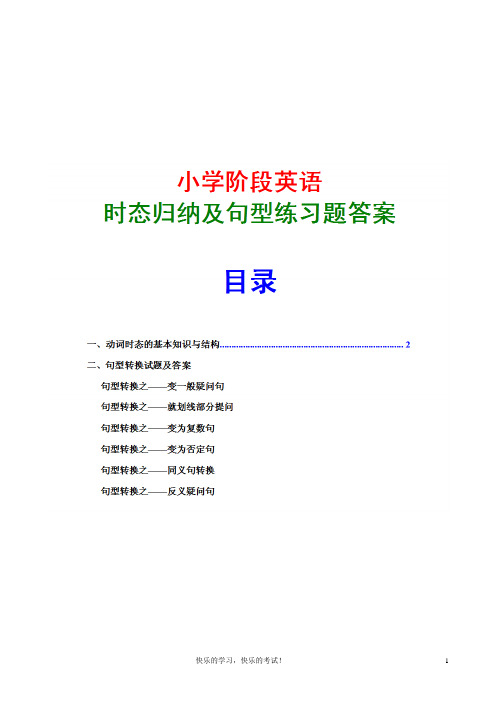
小学英语时态归纳及句型练习一、动词时态的基本知识与结构:句型转换题集(包括答案)(1)改否定句/ 祈使句(2)改一般疑问句(并作肯定或否定回答)(3)把单数句变复数句(4)就划线部分提问(5)同义句转换( 6) 反义疑问句句型转换之------变一般疑问句把下列句子变成一般疑问句1、I am listening to music._______________________________________2、Mike is a student._______________________________________3、Sarah can clean the classroom.________________________________________4、They are in the zoo.________________________________________5、There are some flowers in the vase.________________________________________6、This is my sister._________________________________________7、We are sweeping the floor.____________________________________________8、We need some masks._________________________________9、They like making the puppet._________________________________10、Su Hai and Su Yang live in a new house._________________________________________________ 11、I put a book on my head._________________________________________________ 12、They sing in the classroom together._________________________________________________ 13、We play basketball on Sundays._________________________________________________ 14、Tom likes listening to music__________________________________________________ 15、I am listening to music._______________________________________16. His baseball is under the table.________________________________________________17. I go to school by bike.________________________________________________18. I often go hiking on the weekend._______________________________________________19. She is drawing a picture now.________________________________________________20. Tom is cleaning the classroom._______________________________________________21. She often washes the clothes.__________________________________________________ 22. Xiao ming likes drawing.________________________________________________23. My mother works in a hospital.__________________________________________________ 24. Ma Na`s uncle live in Beijing._______________________________________________25. They walk in the street every evening._____________________________________________________ 26. I often go swimming on Sundays._______________________________________________________ 27. Mark doesn`t like playing the piano.___________________________________________28. The children are going to the zoo next weekend.____________________________________________29. I did my homework yesterday evening._____________________________________________30. Miss Li saw the boy this morning._____________________________________________31. Lily and Lucy went ice-skating yesterday.___________________________________________________ 32. It`s seven o`clock.__________________________________________________ 33. I can see three pencils in the pencil-case____________________________________________________ 34. I am interested in swimming.______________________________________________________ 35. Mike is a student in Grade Six.______________________________________________________ 36. Tom enjoys listening to the music______________________________________________________37.He came to visit China two days ago(两天前).______________________________________________________ 38. I can speak English well.______________________________________________________ 39. Tony had a talk for a long time.______________________________________________________ 40. Jim and Kate often help their grandfather on the farm after school. ______________________________________________________ 41.I am good at(擅长) singing and dancing.______________________________________________________ 42. He wants to be an actor in the future.______________________________________________________ 43.We should take care of the young trees.______________________________________________________ 44. The girls are singing in the classroom.______________________________________________________ 45. She has something to eat.______________________________________________________ 46. Alice came to our home last week(上一周).______________________________________________________ 47. The little boy is standing on the man's shoulders.______________________________________________________ 48.There is some fruit juice in the glass.______________________________________________________ 59. We will visit America next week(下一周).______________________________________________________ 50.She is going to be a middle school student.______________________________________________________句型转换之--------就划线部分提问1.There are thirty people in the room. (对划线部分提问)______________________________________________________ 2.The new coat costs three yuan. (对划线部分提问)_______________________________________________________ 3.You can go there by bus. (对划线部分提问)___________________________________________4.I like it very much. (对划线部分提问)______________________________________________________ 5.The students study English for the country. (对划线部分提问)_____________________________________________________ 6.He went to Beijing yesterday. (对划线部分提问)_____________________________________________________7. My favorite city is Beijing. (对划线部分提问)___________________________________________________8.I’ll be back in a few minutes. (对划线部分提问)_______________________________________________________ 9.Zhang Hong is 1.60 meters tall. (对划线部分提问)_______________________________________________________ 10.This rope is 20 meters long. (对划线部分提问)_______________________________________________________ 11.This elephant is one hundred weight. (对划线部分提问)_______________________________________________________ 12.I have been to Beijing three times. (对划线部分提问)______________________________________________________ 13.He often has lunch in the factory.(对划线部分提问)_______________________________________________________ 14.They live on the third floor.(对划线部分提问)_______________________________________________________ 15.He hurt his leg last Sunday.(对划线部分提问)_______________________________________________________ 16.I got up at six this morning .(对划线部分提问)_______________________________________________________ 17.They were drawing a horse when I came in.(对划线部分提问)_______________________________________________________ 18.People usually clean their houses before Spring Festival.(对划线部分提问) _______________________________________________________ 19.You'd better take the No.3 bus.(对划线部分提问)_______________________________________________________ 20.He's feeling well.(对划线部分提问)_______________________________________________________ 21.The girl in a red coat is my sister.(对划线部分提问)_______________________________________________________ 22.He comes to China once a year.(对划线部分提问)_______________________________________________________23 He goes to see his grandma twice a week. (对划线部分提问)_______________________________________________________ 24. My father goes to work by car. (对划线部分提问)_______________________________________________________ 25. It takes 15 minutes for a ferry to cross the river. (对划线部分提问)__________________________________________________?26. You can dial 110 to call the police. (对划线部分提问)_______________________________________________________ 27. Ted put his bag in the desk. (对划线部分提问)_______________________________________________________28. The students went camping last week. (对划线部分提问)_______________________________________________________29. 3 and 9 is 12. (对划线部分提问)_______________________________________________________30. Diogenes came from Greece. (对划线部分提问)_______________________________________________________31. The way to keep fit is to eat food and take morn exercise. (对划线部分提问)_______________________________________________________32. We landed on an unexplored planet . (对划线部分提问)_______________________________________________________33. I like taking photos in the park. (对划线部分提问)_______________________________________________________34. John comes from Canada. (对划线部分提问)_______________________________________________________35. I usually play football on Friday afternoon. (对划线部分提问)______________________________________________________36. Sun Yang usually washes some clothes on Saturday. (对划线部分提问)_______________________________________________________37 .Xiao Li waters the flowers every day. (对划线部分提问)_______________________________________________________38. Tom does his homework at home. (对划线部分提问)_______________________________________________________39. Mr. Wang went to America by plane. (对划线部分提问)_______________________________________________________40. I came here five years ago. (对划线部分提问)_______________________________________________________41. They moved to France because their father found a job there.(对划线部分提问) _______________________________________________________42. Tom had an egg this morning. (对划线部分提问)_______________________________________________________43. she was in the kitchen . (对划线部分提问)_______________________________________________________44.They were in a spaceship. (对划线部分提问)_______________________________________________________45. I visited a friend. (对划线部分提问)_______________________________________________________46.They cleaned the house yesterday. (对划线部分提问)_______________________________________________________47. we went to school last week. (对划线部分提问)_______________________________________________________48.They weren’t at home yesterday. (对划线部分提问)_______________________________________________________49. Tom read a book last night. (对划线部分提问)_______________________________________________________ 50.I’m playing the football in the playground .(对划线部分进行提问)_______________________________________________________ 51. Tom is reading books in the study. (对划线部分进行提问)_______________________________________________________句型转换之-----变为复数句1.This is my book.(复数)_________________________________2.Is that a cat.(复数)__________________________________3. There is a T-shirt in the box.(变复数句)_____________________________________4. Is there a book in the bag?(变成复数句)______________________________________5. This is a beautiful flower.______________________________________6. Are they American cars? (改为单数)_______________________________________7. She is an English girl. (变为复数)___________________________________________8. He is drinking a cola.(变成复数句子)____________________________________________9. There is a cat behind the door. ( 改为复数形式)_____________________________________________10. There is an old man in the room. ( 改为复数句子)______________________________________________11.This is a box and that is a knife.(改成复数形式)______________________________________________12.There is an orange in the bag.(改为复数句)______________________________________________句型转换之----变为否定句把下列句子变成否定句1. I am listening to music._______________________________________2. Mike is a student._______________________________________3. Sarah can clean the classroom.________________________________________4. They are in the zoo.________________________________________5. There are some flowers in the vase.________________________________________6. This is my sister._________________________________________7. We are sweeping the floor.__________________________________________8. We need some masks._________________________________9. They like making the puppet._________________________________10. Su Hai and Su Yang live in a new house._________________________________________________ 11. I put a book on my head._________________________________________________ 12. They sing In the classroom together._________________________________________________ 13. We play basketball on Sundays._________________________________________________ 14. Tom likes listening to music__________________________________________________ 15. It was sunny yesterday._________________________________________________ 16. The apples are five yuan._________________________________________________ 17. My mem cleans the room every day.__________________________________________________ 18. Peter is going to fly a kite next Sunday.__________________________________________________ 19. My bag is red._____________________________________________20. This shirt is very nice.______________________________________________21. He`s going to the Great Wall._______________________________________________22. It is an elephant.______________________________________________23. He takes some pictures every day.______________________________________________________24. It’s cheap enough.______________________________________________________ 25. The teacher should make the students happy every day.______________________________________________________ 26.Show me your library card,please.______________________________________________________ 27. She gave her brother some tapes about folk music.______________________________________________________ 28. This is the first time we come to Australia.______________________________________________________ 29. We’d better make a shopping list first.______________________________________________________ 30. There are a lot of(大量的)lovely animals there.______________________________________________________ 31. My mother will take me to Beijing for my holiday next Sunday.______________________________________________________ 32. You can find many tall trees in the picture of the park._________________________________________33. The girl is singing in the classroom.______________________________________________34. The waiter and the waitress play table tennis every day.________________________________________________35. He does well in Maths._______________________________________________36. Turn right at the third crossing._________________________________________________ 37. Please turn off the light.___________________________________________________ 38. The boy can jump higher than the girl.___________________________________________________ 39. Mum is going to buy me a new bike.___________________________________________________ 40. Put the shoes near the cupboard.___________________________________________________句型转换之----同义句转换1、Give the purse to me.Give ____ the purse .2、She is going to get up at six o’clock.She ______ _____ ______ at six o’clock.3、What date is it today?___________the date today?4、It’s time for breakfast.It’s time ____________ breakfast.5、What’s the time?_______ time is _______?6. I would like a toy bike as my birthday present.I ________ _______ have a toy bike as my birthday present.7. I was born on the fifth of December.______ ______ _______ on the fifth of Dec.8. My friends buy me some flowersMy friends __________ some flowers __________ me.9. My friends give me some birthday cards.My friends __________ some birthday cards __________ me. 10. Reading is interesting.__________ is __________ __________ read.11. Mr. Zhou often drives a car to work.Mr. Zhou often goes to work ______ _______.12. Do you usually come here by bus?Do you usually _______ a _______ here?13. Kangkang often rides a bike to school.Kangkang often ______ _______ ______ _______ _______.14. It’s time to have lunch.It’s _______ ______ _______.15. I like reading books in the library.I _______ _______ books in the library.16. He likes apples, too.He ______ ________ apples.17. What’s your favorite subject?What subject _______ you _________ __________?18. How do you like science?________ do you ________ __________ science?19. It’s time to have the meeting.It’s time ______ the meeting.20. Why don’t you play basketball with us?Why _______ play basketball with us?21. I sit in front of her. (同义句转换)She ______ ______ me.22. I have a TV set in the living room. (同义句转换)______ ______ a TV set in _____ living room.23. He would like to visit his grandparents tomorrow. (同义句转换)He ______ _______ _______ his grandparents tomorrow.24. There is something wrong with the piano. (同义句转换)The piano __________ __________.25. What’s the matter with you? (同义句转换)_________ ________with you?26. Her home is not far from mine. (同义句转换)My home ________ ________ to hers.27. There are many apples in the box. (同义句转换)There are _______ _______ _______apples in the box.28. There are no houses near the garden. (同义句转换)There ________ _________ _________houses near the garden.29. Zhou Jun goes to bed after she finishes her homework. (同义句转换)Zhou Jun _______ _____ to bed ______ she finishes her homework.30. I get there after him. (同义句转换)He _______ there _______me.31. Take the second turning on the right. (同义句转换)________ ________at the second turning.32. Where’s the supermarket? (同义句转换)_______ can I _______ ______ the supermarket?33. Ming Ming walks to school every day. (改为同义句)Ming Ming ______ to school ______ ______ every day.34. Thank you for helping me.(同义句)Thank you for ______ ______ .35. There aren’t any pears in t he box.(同义句)There are ______ pears in the box.36. Whose are these clothes?(同义句)______ ______ are these?37. Let me look at your book.(同义句)Let me ______ ______ ______ ______ your book.句型转换之-----反义疑问句1. We have to get there at 8:00, _____________?2. He doesn't like history,_______________?3. You aren't from England,__________?4. I am a student,____________?5. There isn't any water in the glass, _____________?6. There will be a football match in the afternoon,__________?7. He must be hungry,______________?8. They must finish their homework,_________________ ?9. There is little milk in the glass, _____________?10. There have never been to London, ___________?11. Everything is ready,_____________?12. Everyone konws the answer,_____________?13. Read the text for us, ____________?14. Don't do that again, ___________?15. Let us go home, ______________?16. Let's go home, __________?17. I think he is right, __________?18. I don't think she cares,____________?19. She thinks he is right, _____________?20 She can swim,__________?21. Tim has made few friends,_____________?22. I'm younger than her,_________?23. There was nothing in the box, ______________?24. The bag must yours,_______________?25. Nobody wants to go there,_______________?26. Nothing is wrong ___________?27. What a kind girl,_____________?28. Go with me,_________________?29. We believe she can do it,_____________?30. I wish to talk with them, __________? (记住此另类)31. There are few apples in the basket, _________?32. He can hardly swim, ___________?33. They seldom come late, __________?34. The girl dislikes history, ___________?35. You thought they could have completed the project,__________?36. They don't believe she's an engineer, _________?37. She doesn't expect that we are coming so soon, _________?38. You’d better get up early, __________?39. He has two sisters,_________?40. He has two sisters,_____________?41. He doesn't have any sisters,______________?42. Give me a hand,_____________?43. Leave all the things as they are,_____________?44. I'm as tall as your sister,____________?45. The Swede made no answer, _____________?46. Some plants never blown (开花), _________ ?47. He ought to know what to do, ______________?48. We have to get there at eight tomorrow, ____________?49. He used to take pictures there, ______________?50. You'd better read it by yourself,_____________?51. He would rather read it ten times than recite it, ___________?52. He said he wanted to visit Japan, __________?53. He must be there now, _______________?54. You’re new here, _________ __________?55. She’s the Miss World, _________ __________?56. Bob likes thrillers, _________ __________?57. Jim will be a scientist in 10 years, _______ _______?58. Lily has been to America, _________ __________?59. The twins would like to go swimming, ______ _____?60. You weren’t born in Beijing, _________ __________?61. Nancy isn’t watching TV at home, ______ _______?62. The boy was riding a bike at that time, ______ _____?63. We can’t talk now, _________ __________?64.The little boy hurt his foot, _______ _______?65.You were late yesterday, _______ _______?66. The little girl could hardly speak at the age of 3, _______ _______?67. There is little water left, _______ _______?68. There are few people in the cinema, ________ _______?69. He never comes to school late, _______ _______?70. Nobody knows him here, _______ _______?71. Few people knew this word, _______ _______?72. The king was unhappy, _______ _______?73. That book is useless to us, _______ _______?74. He dislikes dancing, _______ _______?75. Everyone is having a good time on the farm, _______ _______?76. Nothing has happened here, _______ _______?77. Nobody likes that brown dog, _______ _______?78. Don’t make any noise, _______ _______?79. Let’s go to the cinema together, _______ _______?80. Let us pay a visit to Shenzhen,_______ ______?81. David says you will come in time, _______ _______?82. I think they knew little about it, _______ _______?83. We think he is wrong, _______ _______?84. We don’t believe he will come, _______ _______?85. There were only six people now, _______ _______?86. There will be a football match tomorrow, _______ _______?87. Y ou’d better not stand in the row, _______ _______?88. You’d like to go there, _______ _______?综合练习1. The children had a good time in the park.否定句:__________________________________________一般疑问句:________________________________________2. There were about nine hundred people at the concert.(音乐会)否定句:__________________________________________一般疑问句:________________________________________对划线部分提问:____________________________________3. There was only one problem.否定句:__________________________________________一般疑问句:________________________________________肯定/否定回答:____________________________________4. Ann did her homework yesterday evening.否定句:__________________________________________一般疑问句:________________________________________对划线部分提问:____________________________________5. Last week I read an English book.否定句:__________________________________________ 一般疑问句:________________________________________ 肯定/否定回答:____________________________________ 对划线部分提问:____________________________________6. My brother was in the park just now.否定句:__________________________________________ 一般疑问句:________________________________________ 肯定/否定回答:____________________________________ 对划线部分提问:____________________________________7. She had some bread for lunch today.否定句:__________________________________________ 一般疑问句:________________________________________ 肯定/否定回答:____________________________________ 8. They read English last night.否定句:__________________________________________ 一般疑问句:________________________________________ 肯定/否定回答:____________________________________ 对划线部分提问:____________________________________9. She went to the park.变成一般疑问句____________________________________________及否定句____________________________________________10. I cleaned my bedroom yesterday.变成一般疑问句____________________________________________否定句____________________________________________11. He can sweep the floor.变成一般疑问句____________________________________________否定句____________________________________________12. I like apples.变成一般疑问句____________________________________________否定句______________________________________13. He usually goes to school on foot.变成一般疑问句____________________________________________ 否定句____________________________________________14. My mother often does housework on Sundays.变成一般疑问句____________________________________________ 否定句____________________________________________15. We play football.变成一般疑问句____________________________________________ 否定句____________________________________________16. She is tired。
小学英语句子公式及小学英语的四种时态

小学英语句子公式及小学英语的四种时态,有些不怎么懂小学英语句子公式1.主+谓+xx2.主+谓+动名词3.主+谓+介词+动词4.主+谓+介词+名词谓语就是动词。
eg1:I am a girl.其中,i是主语,am就是谓语,girl就是宾语。
(a是量词)eg2:I love money.同样,i是主语,love是谓语,money就是宾语。
(the 是量词)简单来说谓语就是动词,宾语就是跟在谓语后面的名词。
又比如:I like shopping.这句话里,i是主语,like是谓语,而shopping就是动名词。
因为动词(谓语)后面不能再紧跟另一个动词,所以如同上面一句例句“我喜欢购物”,“喜欢”是一个动词,“购物”又是一个动词,这种情况下我们就只能把后面一个动词改成名词,所以后面就要加-ing。
所以说,动名词就是动词+ing形式的名词。
小学英语的四种时态一般过去时的陈述句:主语+动词过去式+宾语一般过去时的否定句:主语+didn't +动词原形+宾语主语+ was/were not +宾语一般过去时的一般疑问句:Did +主语+动词原形+宾语?was/were +主语+宾语?一般过去时的特殊疑问句::特殊疑问词+一般过去时的一般疑问句一般现在时的陈述句:主语+动词原形或单三形式动词(根据主语的变化而变化)+宾语一般现在时的否定句:主语+don't/doesn't +动词原形+宾语主语+ am/is/are+not +宾语一般现在时的一般疑问句:Do/Does +主语+动词原形+宾语?Is / Are+主语+宾语?特殊疑问句:特殊疑问词+一般现在时的一般疑问句?现在进行时的陈述句:主语+ Be +现在分词+宾语现在进行时的否定句:主语+ be+ not+现在分词+宾语现在进行时的一般疑问句:Be+主语+现在分词+宾语现在进行时的特殊疑问句:特殊疑问词+一般疑问句一般进来时的陈述句:主语+will/be going to+动词原形+宾语一般将来时的否定句:主语+won't/be+not going to +动词原形+宾语一般将来时的一般疑问句:Will +主语+动词原形+宾语?Be +主语+ going to +动词原形+宾语一般将来时的特殊疑问句:特殊疑问词+一般将来时的一般疑问句。
(完整版)小学英语四种时态知识点加练习

小学英语四种时态知识点加练习一、一般现在时一. 意义:表示经常发生的事情,动作或存在的状态二. 构成及变化1.be动词的变化。
肯定句:主语+be(am,is,are)+其它。
如:I am a boy.我是一个男孩。
否定句:主语+ be + not +其它。
如:He is not a worker.他不是工人。
一般疑问句:Be +主语+其它。
如:-Are you a student? -Yes. I am. / No, I'm not.特殊疑问句:疑问词+一般疑问句。
如:Where is my bike?2. 行为动词的变化。
l、当主语为第一,二人称及复数时,助动词为do肯定句:主语+动词原形(+其它)。
如:We often play basketball after school.否定句:主语+ don't+动词原形(+其它)。
如:we don’t play basketball after school.一般疑问句:Do +主语+动词原形+其它?如:Do you often play basketball after school? Yes, we do. / No, we don't.特殊疑问句:疑问词+以do开头的一般疑问句?如:What do you often do after school ?2、当主语为第三人称单数时,助动词为does肯定句:主语+动词三单式(+其它)。
如:He swims well.否定句:主语+ doesn’t+动词原形(+其它)。
如:He doesn’t swim well..一般疑问句:Does +主语+动词原形+其它。
如:Does he swim well ?Yes, he does. / No, he doesn't.特殊疑问句:疑问词+以does开头的一般疑问句?如:How does your father go to work?三.第三人称单数的动词变化规则(只有在第三人称为主语的肯定句中,动词才用三单式)(1)多数动词直接加s: runs gets likes collets takes plays climbs…….(2)结尾是s, x, sh, ch, o,前为辅音字母, 结尾加es :watches teaches goes does washes crosses mixes brushes(3)动词末尾y前为辅音:将y改为i加es: study→studies fly→flies carry→carries cry→cries但在y前如果为元音则直接加s:buys says四.时间标志:always , usually , often , sometimes ,every…一般现在时练习题I.用下列单词的适当形式填空1.We often___________(play) in the playground.2.He _________(get) up at six o’clock.3.__________you _________(brush) your teeth every morning?4.What________________(do) he usually________________(do) after school?5.Danny ________________(study) English, Chinese, maths, science and Art at school.6.Mike sometimes __________(go) to the park with his sister.7.At eight at night, she __________(watch) TV with his parents.8.________ Mike________(read) English every day?9.How many lessons_________your classmates________(have) on Monday?10.What time_________his mother_________(do) the housework?II.改句子1.Do you often play football after school? (改为肯定句)2.I have many books.(改为否定句)3.Gao Shan’s sister likes playing table tennis (改为否定句)4.She lives in a small town near New York.(改为一般疑问句)5.I watch TV every day.(改为一般疑问句)6.We have four lessons.(改为否定句)7.Nancy doesn’t run fast (改为肯定句)二、现在进行时一、概念现在进行时表示说话时正在进行或发生的动作,也可表示当前一段时间内的活动或现阶段正在进行的动作。
小学英语四大时态及句式变化

小学英语四大时态各时态句式1、含有be 动词的句子:否定句:在be 动词后加notHe is not a teacher. (is not=isn a teacher. (is not=isn ’t) Y ou were not at home yesterday. (were not=weren ’t) I am not doing my homework. doing my homework. She is not going to swim tomorrow. 一般疑问句:把be 动词提到主语前面,句号变问号Is he a teacher? Were you at home yesterday? Are you doing your homework? Is she going to swim tomorrow? (含有情态动词的句子,将情态动词看成be 动词,一样方式进行变换) 时态时态 概念概念 结构结构关键词关键词 一般过去时 表示过去发生的动作或存在的状态存在的状态 动词变为过去式动词变为过去式过去的时间词:yesterday yesterday, , lastweek, three years ago一般现在时 经常性发生的动作或存在状态在状态主语为“三单”,动词加s/es ;非“三单”,动词用原形,动词用原形 频度副词:sometimes, usually, often, always, never, seldom every day 现在进行时 现在正在发生的动作发生的动作be + v .v.ing Listen, look, now, at+具体时间点具体时间点 一般将来时 将来发生的动作或存在的状态的状态 be going to/will 动词原形动词原形 将来的时间词:tomorrow, tomorrow, the the the day day after tomorrow, next+一段时间一段时间2、含有实义动词的句子否定句:请助动词do, 在do 后加not ,句中实义动词用原形注意:do do——does, did, don don’’t- doesn ’t, didn ’t I do not like him. (do not = don’t) He doesn doesn’’t like apples. Y ou didn didn’’t like him. 一般疑问句:在请助动词do, 将do 提到主语前面,句中实义动词用原形Do you like me? Does he like apples? Did you go to school yesterday? 3、特殊疑问句,助动词和be 动词都要放在特殊疑问词后、主语之前What do you usually do on Sunday? What are you doing here? Where are you going to visit on holiday? 。
小学英语的四种时态知识点
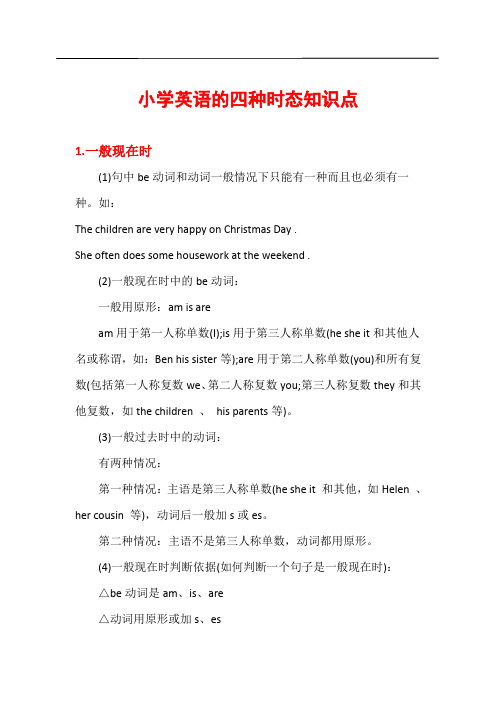
小学英语的四种时态知识点1.一般现在时(1)句中be动词和动词一般情况下只能有一种而且也必须有一种。
如:The children are very happy on Christmas Day .She often does some housework at the weekend .(2)一般现在时中的be动词:一般用原形:am is aream用于第一人称单数(I);is用于第三人称单数(he she it和其他人名或称谓,如:Ben his sister等);are用于第二人称单数(you)和所有复数(包括第一人称复数we、第二人称复数you;第三人称复数they和其他复数,如the children 、his parents等)。
(3)一般过去时中的动词:有两种情况:第一种情况:主语是第三人称单数(he she it 和其他,如Helen 、her cousin 等),动词后一般加s或es。
第二种情况:主语不是第三人称单数,动词都用原形。
(4)一般现在时判断依据(如何判断一个句子是一般现在时):△be动词是am、is、are△动词用原形或加s、es△没有时间状语或有usually、often、everyday、sometimes等不是具体的时间(5)有用的的依据:Be动词是is、am ←→名词用原形(这里包括可数名词的单数和不可数名词)Be动词是are ←→名词加s或es动词加s或es ←→主语是第三人称单数动词用原形←→主语不是第三人称单数(6)情态动词:我们现在学过的情态动词有:can、must、should、would。
情态动词后动词总是用原形。
(不受其他任何条件影响)2.一般过去时(1)句中be动词和动词一般情况下只能有一种而且也必须有一种。
如:The girls were on the grass just now .They visited my parents last weekend .(2)一般过去时中的be动词:一般用过去式:was werewas用于第一人称单数(I)和第三人称单数(he she it和其他人名或称谓,如:Ben 、his sister等);were用于第二人称单数(you)和所有复数(包括第一人称复数we、第二人称复数you;第三人称复数they 和其他复数,如the children 、his parents等)。
小学英语必会八大时态最全总结

(一)一般现在时定义:经常、反复发生的动作或行为及现在的某种状况。
时间状语:often, usually, always, sometimes, everyday(week,month),once a week,on Mondays, etc.结构:1.be动词2.行为动词主语+be+其他一般疑问句:1.把动词be放于句首。
2.用助动词do提问,如主语为第三人称单数,则用does,同时还原为动词原形。
否定句形式:1.am/is/are+not2.此时态的谓语动词若为行为动词,则在其前加d on’t;若主语为第三人称单数,则用doesn’t,同时还原行为动词。
(二)现在进行时定义:表示现阶段或说话时正在进行的动作或状态。
时间状语:now, at this time, these days, etc.结构:主语+am/ is/ are +doing一般疑问句:把be动词放在句首。
否定句形式:主语+am/ is/ are +not +doing(三)一般过去时定义:过去某个时间里发生的动作或状态;过去习惯性、经常性的动作、行为。
时间状语:ago, yesterday, last week(month, year…), in 2000, just now, one day,long long ago, etc.结构:1.was/were2.行为动词过去式一般疑问句:1.把was或 were放于句首。
2.用助动词did提问,同时还原为动词原形。
否定句形式:1.主语+was/were+ not2.在行为动词前加do在其前加didn’t,同时还原行为动词。
(四)过去进行时定义:表示过去某段时间或某一时刻正在发生或进行的动作或行为。
时间状语:at this time yesterday或以when引导的谓语动词是一般过去时的时间状语等。
结构:主语+was/were+ doing一般疑问句:把was或were放在句首。
英语的时态(小学必会)
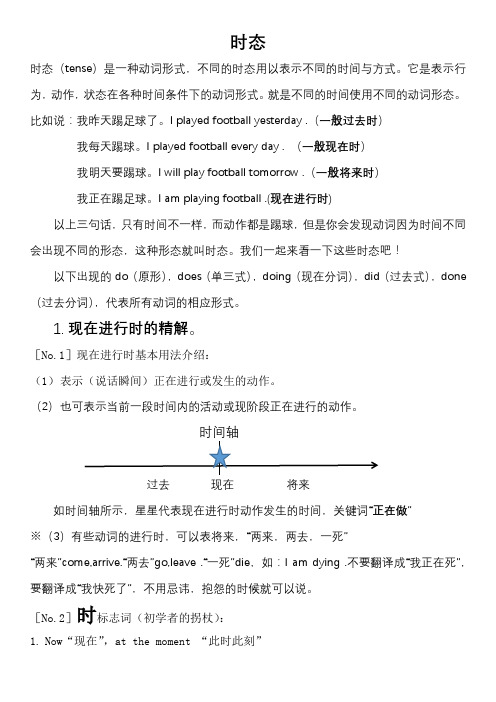
时态时态(tense)是一种动词形式,不同的时态用以表示不同的时间与方式。
它是表示行为,动作,状态在各种时间条件下的动词形式。
就是不同的时间使用不同的动词形态。
比如说:我昨天踢足球了。
I played football yesterday .(一般过去时)我每天踢球。
I played football every day . (一般现在时)我明天要踢球。
I will play football tomorrow .(一般将来时)我正在踢足球。
I am playing football .(现在进行时)以上三句话,只有时间不一样,而动作都是踢球,但是你会发现动词因为时间不同会出现不同的形态,这种形态就叫时态。
我们一起来看一下这些时态吧!以下出现的do(原形),does(单三式),doing(现在分词),did(过去式),done (过去分词),代表所有动词的相应形式。
1.现在进行时的精解。
[No.1]现在进行时基本用法介绍:(1)表示(说话瞬间)正在进行或发生的动作。
(2)也可表示当前一段时间内的活动或现阶段正在进行的动作。
过去现在将来如时间轴所示,星星代表现在进行时动作发生的时间,关键词“正在做”※(3)有些动词的进行时,可以表将来,“两来,两去,一死”“两来”come,arrive.“两去”go,leave .“一死”die,如:I am dying .不要翻译成“我正在死”,要翻译成“我快死了”,不用忌讳,抱怨的时候就可以说。
[No.2]时标志词(初学者的拐杖):1.Now“现在”,at the moment “此时此刻”2.Look!“看”,Listen! “听”等(让你看或听得事情,一定是正在发生的)识记标志词的意义:不同的时间使用不同的动词形态,所以学习时态,一定要记住各个时态的标志。
[No.3]态构词法(现在分词):不同的时间使用不同的动词形态,所以学习时态,一定要记住各个时态动词相对应的形式,一个萝卜一个坑!现在进行时的动词要使用现在分词,也就是我们说的动词ing。
小学英语五种时态

小学英语五种时态一、一般现在时:1.概念:(1)经常、反复发生的动作或行为及现在的某种状况。
(2)客观真理,客观存在,科学事实2.时间状语:always, usually, often, sometimes, every week (day, year, mont h…), once a week, on Sundays,3.基本结构:主语+be(am/is/are)/动原(主语为第三人称单数或不可数名词时,动词上要加(e)s )4.否定形式:主语+am/is/are+not;主语+don't /doesn't +动原(前面有助动词do,does时,要把动词还原)5.一般疑问句:be (am/is/are)+主语do /does +主语+动原(前面有助动词do,does时,要把动词还原)6.例句:. It seldom snows here. 这里很少下雪。
Water gets clean .水变清澈了He is always ready to help others. 他总是乐于助人。
Action speaks louder than words.事实胜于雄辩。
The moon move round the earth。
月亮绕着地球转。
二、一般过去时:1.概念:①过去某个时间里发生的动作或状态;②过去习惯性、经常性的动作、行为。
2.时间状语:ago, yesterday, the day before yesterday(前天), last week(year, night, month…), in 1989, just now, at the age of 5,one day, long long ago, once upon a time, etc.3.基本结构:①主语+ was/were ②主语+动词过去式(v-ed)4.否定形式:①主语+ was/were+not ②主语+didn't+动原5.一般疑问句:①Was/Were+主语…②Did+主语+动原…6.例句:She often came to help us in those days. (过去一段时间内)I didn't know you were so busy. (过去某个时间点)三、一般将来时:1. 概念:表示将要发生的动作或存在的状态及打算、计划或准备做某事。
完整版小学英语四大时态总结

小学英语四大时态总结小学英语四大时态总结一.一般现在时:1. 一般现在时的简单用法:表示经常的,习惯性的动作或存在的状态。
一般现在时经常与often,always,usually,sometimes,every day等时间状语连用。
否定句:主语+ be + not +其它。
如:He is not a worker.他不是工人。
一般疑问句:Be +主语+其它。
如:-Are you a student? -Yes. I am. / No, I'm not. 特殊疑问句:疑问词+一般疑问句。
如:Where is my bike? 5. 行为动词的变化。
否定句:主语+ don't( doesn't ) +动词原形(+其它)。
如:I don't like bread. 当主语为第三人称单数时,要用doesn't构成否定句。
如:He doesn't often play. 一般疑问句:Do( Does ) +主语+动词原形+其它。
如:- Do you often play football? - Yes, I do. / No, I don't. 当主语为第三人称单数时,要用does 构成一般疑问句。
如:- Does she go to work by bike? - Yes, she does. / No, shedoesn't. 特殊疑问句:疑问词+一般疑问句。
如:How does your father go to work? 二.现在进行时:1.现在进行时:表示现在正在进行或发生的动作,也表示当前一段时间内的活动或现阶段正在进行的动作。
2.结构:be ( am, is, are )+doing (所有的动词+ing)3.ing 的变化规则:2).现在进行时的一般疑问句把be动词调到句首。
Is he working at home? 3).现在进行时的特殊疑问的基本结构为:特殊疑问词+ be + 主语+ 动词ing? What are you doing? 三.一般过去时:Page 1 of 6.I. 一般过去时的概念:表示过去某个时间发生的动作或存在的状态。
小学时态语法句型复习
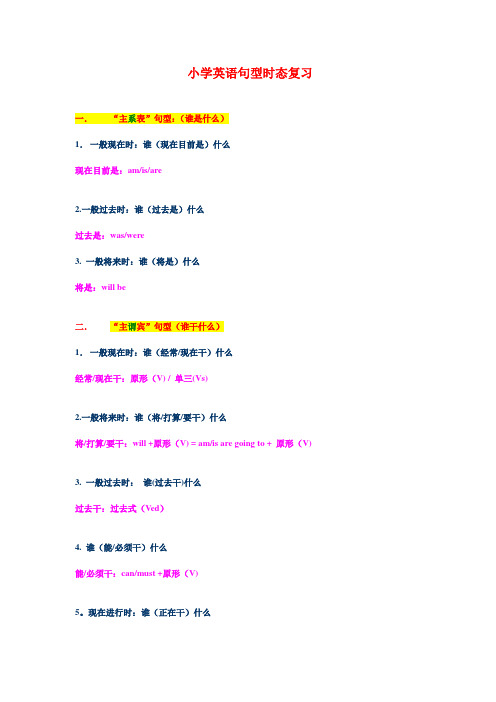
小学英语句型时态复习一.“主系表”句型:(谁是什么)1.一般现在时:谁(现在目前是)什么现在目前是:am/is/are2.一般过去时:谁(过去是)什么过去是:was/were3. 一般将来时:谁(将是)什么将是:will be二.“主谓宾”句型(谁干什么)1.一般现在时:谁(经常/现在干)什么经常/现在干:原形(V) / 单三(Vs)2.一般将来时:谁(将/打算/要干)什么将/打算/要干:will +原形(V) = am/is are going to + 原形(V) 3. 一般过去时:谁(过去干)什么过去干:过去式(Ved)4. 谁(能/必须干)什么能/必须干:can/must +原形(V)5。
现在进行时:谁(正在干)什么正在干:am/is/are +现在分词(Ving)三.“There be+名词”句型(有什么)1.一般现在时:现在有什么There is/are +....2 一般过去时:过去有什么There was/were +....四.祈使句:表示请求和命令的句子,以“动词原形/Be”开头。
五.感叹句:1.What +a/an+ adj +n+主+系/谓!2.How+ adj +主+系/谓!六.变句子需要注意的问题:1.肯定句变一般问句(1)提前:肯定句有am/is/are/was/were/can/may/will/must/would放到主语前(2)加词:肯定句有“动词原形V/动词单三Vs/动词过去Ved",就在主语分别前加do/does/did,注意后面的动词用原形(3)回答用代词/ 第一人称换第二人称/some换any2.肯定句变否定句(1)直接加not:肯定句有be/can/will/must/would+直接在它们前面加not(2)添词加not:肯定句有原形/单三/过去式,在它们前面加don't/doesn't/didn't,注意后面的动词用原形3.对画线部分提问(1)看横线选疑问词,再变一般问句(疑问词+一般问句?)人-who/ 地方-where /东西-what /时间- when/what time颜色-what color/ 谁的-whose/ 岁数-how old /形容词/副词-how 动作- what....do的某种形式/(数量)+名词:how many/much+名词频率-how often / 距离-how far(2)对句子主语提问,换疑问词(当单数用),顺序不变(3)日常问句问候:How are you today?问病:What the matter (with sb)?问天气:What's the weather like?= How is the weather?问几点:What time is it?= What is the time?问星期:What day is it today?问几月几号:What's the date today?问价钱:How much is/are +东西?问工作:What's your job?/What do you do?问年龄/身高体重:How old/tall/heavy are you?。
英语的时态(小学必会)
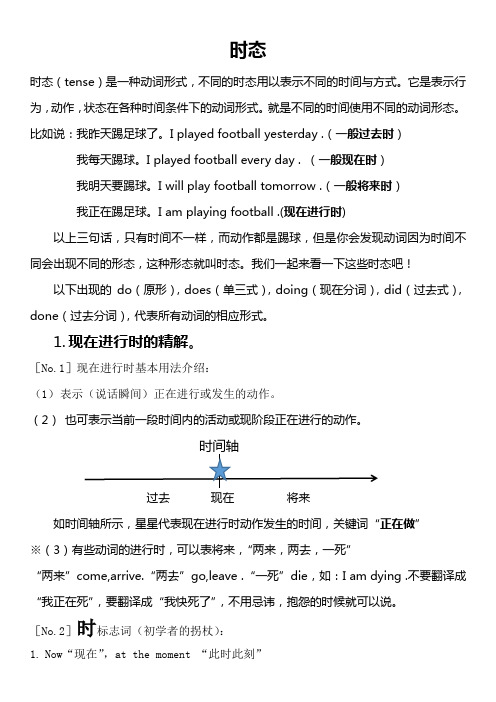
时态时态(tense)是一种动词形式,不同的时态用以表示不同的时间与方式。
它是表示行为,动作,状态在各种时间条件下的动词形式。
就是不同的时间使用不同的动词形态。
比如说:我昨天踢足球了。
I played football yesterday .(一般过去时)我每天踢球。
I played football every day . (一般现在时)我明天要踢球。
I will play football tomorrow .(一般将来时)我正在踢足球。
I am playing football .(现在进行时)以上三句话,只有时间不一样,而动作都是踢球,但是你会发现动词因为时间不同会出现不同的形态,这种形态就叫时态。
我们一起来看一下这些时态吧!以下出现的do(原形),does(单三式),doing(现在分词),did(过去式),done(过去分词),代表所有动词的相应形式。
1.现在进行时的精解。
[No.1]现在进行时基本用法介绍:(1)表示(说话瞬间)正在进行或发生的动作。
(2)也可表示当前一段时间内的活动或现阶段正在进行的动作。
过去现在将来如时间轴所示,星星代表现在进行时动作发生的时间,关键词“正在做”※(3)有些动词的进行时,可以表将来,“两来,两去,一死”“两来”come,arrive.“两去”go,leave .“一死”die,如:I am dying .不要翻译成“我正在死”,要翻译成“我快死了”,不用忌讳,抱怨的时候就可以说。
[No.2]时标志词(初学者的拐杖):1.Now“现在”,at the moment “此时此刻”2.Look!“看”,Listen! “听”等(让你看或听得事情,一定是正在发生的)识记标志词的意义:不同的时间使用不同的动词形态,所以学习时态,一定要记住各个时态的标志。
[No.3]态构词法(现在分词):不同的时间使用不同的动词形态,所以学习时态,一定要记住各个时态动词相对应的形式,一个萝卜一个坑!现在进行时的动词要使用现在分词,也就是我们说的动词ing。
小学英语时态总结
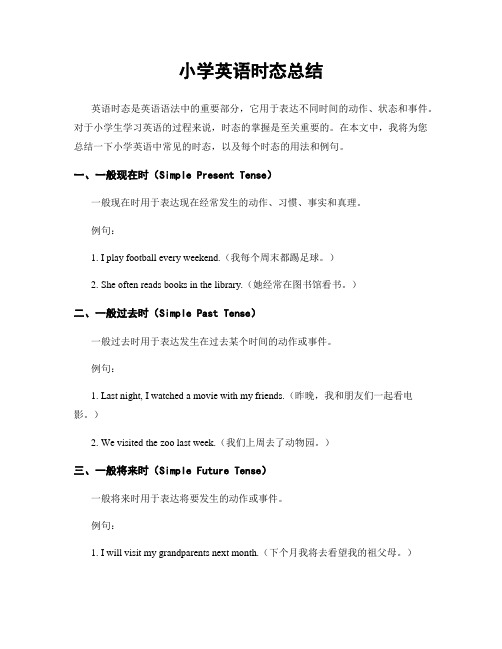
小学英语时态总结英语时态是英语语法中的重要部分,它用于表达不同时间的动作、状态和事件。
对于小学生学习英语的过程来说,时态的掌握是至关重要的。
在本文中,我将为您总结一下小学英语中常见的时态,以及每个时态的用法和例句。
一、一般现在时(Simple Present Tense)一般现在时用于表达现在经常发生的动作、习惯、事实和真理。
例句:1. I play football every weekend.(我每个周末都踢足球。
)2. She often reads books in the library.(她经常在图书馆看书。
)二、一般过去时(Simple Past Tense)一般过去时用于表达发生在过去某个时间的动作或事件。
例句:1. Last night, I watched a movie with my friends.(昨晚,我和朋友们一起看电影。
)2. We visited the zoo last week.(我们上周去了动物园。
)三、一般将来时(Simple Future Tense)一般将来时用于表达将要发生的动作或事件。
例句:1. I will visit my grandparents next month.(下个月我将去看望我的祖父母。
)2. They are going to have a family trip in the summer.(他们打算在夏天进行一次家庭旅行。
)四、现在进行时(Present Continuous Tense)现在进行时用于表达正在进行的动作。
例句:1. They are studying English at the moment.(他们此刻正在学习英语。
)2. We are having dinner right now.(我们正在吃晚饭。
)五、过去进行时(Past Continuous Tense)过去进行时用于表达过去某个时间正在进行的动作。
小学英语时态和语法总结

小学英语时态和语法总结一、现在时态(Present Simple)1. 用法:表示经常性的动作、习惯、常态、真理等。
2. 构成:主语 + 动词原形(第三人称单数要加-s)3. 特殊用法:a) 认真、真诚的祈使句:Be satisfied with your life.b) 当现在是将来动作或安排:My plane leaves in one hour.c) 描述本能或内在特征:The earth moves around the sun.d) 当主语是it,后面是名词从句时:It seems that she knows the answer.e) 表示世界真理或普遍真理:The sun rises in the east.4. 注意事项:a) 第三人称单数动词要加-s。
b) 当主语是第一或第二人称,或者是复数,动词不变。
二、现在进行时态(Present Continuous)1. 用法:表示现在正在进行的动作。
2. 构成:主语 + am / is / are + 动词的现在分词(-ing形式)3. 特殊用法:a) 表示近期打算:I am going to the cinema tonight.b) 表示变化发展的情况:The weather is getting worse.c) 表示接下来安排好的未来动作:I am seeing a movie tomorrow.d) 表示抱怨或责备:You are always misbehaving!4. 注意事项:动词的现在分词的构成规则需要注意。
如:study - studying, play - playing, run - running。
第1页/共5页三、过去时态(Past Simple)1. 用法:表示过去发生的动作或状态。
2. 构成:主语 + 动词过去式3. 特殊用法:a) 表示“过去经常性的动作”:I often walked to school when I was young.b) 表示“在过去的某个时间发生的动作”:I visited my grandparents last weekend.c) 用于条件句中,表示假设:If I had enough money, I would buya car.4. 注意事项:动词的过去式需要根据规则进行变化,如:study - studied, play - played, run - ran。
小学英语三种时态总结
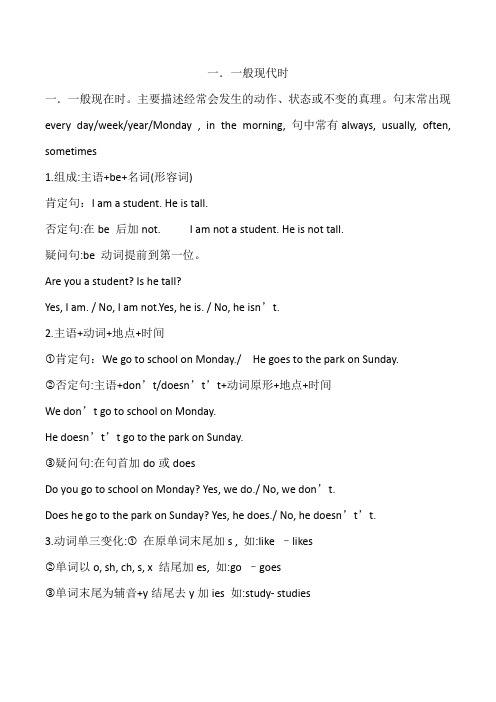
一.一般现代时一.一般现在时。
主要描述经常会发生的动作、状态或不变的真理。
句末常出现every day/week/year/Monday , in the morning, 句中常有always, usually, often, sometimes1.组成:主语+be+名词(形容词)肯定句:I am a student. He is tall.否定句:在be 后加not. I am not a student. He is not tall.疑问句:be 动词提前到第一位。
Are you a student? Is he tall?Yes, I am. / No, I am not.Yes, he is. / No, he isn’t.2.主语+动词+地点+时间①肯定句:We go to school on Monday./ He goes to the park on Sunday.②否定句:主语+don’t/doesn’t’t+动词原形+地点+时间We don’t go to school on Monday.He doesn’t’t go to the park on Sunday.③疑问句:在句首加do或doesDo you go to school on Monday? Yes, we do./ No, we don’t.Does he go to the park on Sunday? Yes, he does./ No, he doesn’t’t.3.动词单三变化:①在原单词末尾加s , 如:like –likes②单词以o, sh, ch, s, x 结尾加es, 如:go –goes③单词末尾为辅音+y结尾去y加ies 如:study- studies二.现在进行时现在进行时:主要叙述正在发生的事情。
句末常出现now, 句首常出现look, listen,in this photo组成:主语+be +动词ing形式I am reading English. /They are swimming. /He is playing football.否定句:在be后加not. I am not reading English. / They are not swimming. He is not playing football.疑问句:将be 放到第一位。
小学英语语法六种时态

小学英语语法六种时态英语语法中,有六种基本的时态,包括简单现在时、简单过去时、简单将来时、现在进行时、过去进行时和将来进行时。
下面是一篇大约的关于这六个时态的说明:一、简单现在时 (Simple Present Tense)简单现在时表示经常发生的动作或事实,也用于表示现在的状态或真理。
形式:肯定句:主语 + 动词原型 + 其他否定句:主语 + do/does + not + 动词原型 + 其他疑问句:Do/Does + 主语 + 动词原型 + 其他例句:1. I live in Beijing.(我住在北京)2. She doesn't like coffee.(她不喜欢咖啡)3. Does he play basketball?(他打篮球吗?)二、简单过去时 (Simple Past Tense)简单过去时表示在过去某个时间发生的动作或状态。
形式:肯定句:主语 + 动词过去式 + 其他否定句:主语 + did + not + 动词原型 + 其他疑问句:Did + 主语 + 动词原型 + 其他第1页/共4页例句:1. We watched a movie yesterday.(我们昨天看电影了)2. He didn't go to the party.(他没去参加派对)3. Did you finish your homework?(你完成作业了吗?)三、简单将来时 (Simple Future Tense)简单将来时表示将要发生的动作或状态。
形式:肯定句:主语 + will + 动词原型 + 其他否定句:主语 + will + not + 动词原型 + 其他疑问句:Will + 主语 + 动词原型 + 其他例句:1. I will call you tomorrow.(我明天会给你打电话)2. She won't be late for the meeting.(她不会迟到参加会议)3. Will they come to the party?(他们会来参加派对吗?)四、现在进行时 (Present Continuous Tense)现在进行时表示正在进行的动作或状态。
- 1、下载文档前请自行甄别文档内容的完整性,平台不提供额外的编辑、内容补充、找答案等附加服务。
- 2、"仅部分预览"的文档,不可在线预览部分如存在完整性等问题,可反馈申请退款(可完整预览的文档不适用该条件!)。
- 3、如文档侵犯您的权益,请联系客服反馈,我们会尽快为您处理(人工客服工作时间:9:00-18:30)。
PEP小学英语常见句型及时态[一] to be句型:用于介绍个人情况如姓名、健康状况、身份、国籍、家庭成员、朋友、职业等,描述地点、颜色、四季、日期、星期几等,该句型广泛分布于各册教材中,其中5——8册的句型主要有:1. Who’s your English teacher? Mr. Carter.2. What’s he like? He’s tall and strong.3. Is she quiet? No, she isn’t. She is very active.4. Is she strict? Yes, she is, but she’s very kind.5. What day is it today? It’s Wednesday.6. What’s your favourite fruit/food…?7. They’re sweet/ sour/ salty/ healthy/…8. When is your birthday? It’s in May.9. My birthday is in June. Uncle B ill’s birthday is in June, too.10. Is her birthday in June? Yes, it is.11. What’s the date?12.This is Zhang Peng.13. Where is the cinema, please? It’s next to the hospital.14. How tall are you?I’m 164 cm tall.15. You are shorter than me.16.You’re 4 cm taller than me.17.How heavy are you? I’m 48 kg.18. I’m thinner than you, and shorter.19. What’s the matter with you? My throat is sore.20. How are you, Liu Yun / Sarah?[二] there be句型:表示存在,即:“某处有某物”或“某时有某事”。
句型基本结构为:There is+ 可数名词单数或不可数名词+时间或地点。
There are+可数名词复数+地点。
该句型主要分布在第5册的Unit 5和Unit 6中,如:1. There are two bedrooms, a kitchen, a bathroom and a living room.2. There is a mirror, a bed and a big closet.3. Is there a forest in the park? Yes, there is.4. Is there a river? No, there isn’t.5. Are there any pandas in the mountains? No, there aren’t.6. Are there any fish in the rivers? Yes, there are.[三] 一般现在时句型:表示习惯性的动作或行为,或现在存在着的状况。
句型基本结构为:主语+行为动词+其他。
当主语是第三人称单数时,要在动词原形后面加s或es,其他人称作主语时则用动词原形,在问句及否定句中需要用助动词do或does。
这种句型通常有一些标志词,如:usually often sometimes never always等。
该句型主要分布在第5册Unit2&3,第6册Unit1&2, 第7册Unit4,5,6, 第8册Unit2中。
如:Book5: 1. What do you have on Thursdays? We have English, math and science on Thursdays. 2. What do you do on Saturdays? I watch TV on Saturdays. 3. I do my homework. 4. What do you have for lunch on Mondays? We have tomatoes, tofu and fish. 5. I like fruit. But I don’t like grapes.Book6: 1. When do you eat dinner? I eat dinner at 7:00 in the evening. 2. When do you get up? I usually get up at 12:00 noon. 3. What do you do on the weekend? Usually I watch TV and go shopping. 4. Sometimes I visit my grandparents. I often play football. Sometimes I go hiking. 5. Which season do you like best? I like winter best. 6. Why do you like summer/winter?Book7: 1. How do you go to school, Sarah? 2. Usually I go to school on foot. Sometimes I go by bike. 3. I like collecting stamps. He likes collecting stamps, too. 4. Does she teach math? Yes, she does. 5. Does she teachEnglish?No, she doesn’t. She teaches math. 6. What does your mother do? What does your father do? 7. Where does she work? She works in a car company. 8. How does she go to work? She goes to work by bus. 9. Where does the rain come from? It comes from the clouds. 10. Where does the cloud come from? It comes from the vapour. 11. Where does the vapour come from? It comes from the water in the river. 12. The sun shines and the water becomes vapour. 13. How do you do that? Book8: 1. My nose hurts. 2. How do you feel? I feel sick. How does Amy feel? 3. You look so happy. You look sad today.[四] 现在进行时句型:表示说话时正在进行的动作或事件,或在短期内正在进行的动作或存在的情况。
标志词是:now 也常用在Look! Listen!等后面。
句型主要结构为:be动词(am, is, are)+动词现在分词(v. ing)。
该句型主要分布在第6册Unit4, 5, 6中。
如:1. What are you doing? I’m doing the dishes. I’m reading a book.2. Grandpa is writing a letter. Brother is doing homework. Mom is cooking dinner in the kitchen.3. He is writing an e-mail in the study. 3. What is it doing ? It’s eating bananas.4. What is she doing ?She’s jumping. 5. What are they doing ? They’re swimming. They’ re climbing trees. 6. Are you eating lunch? No, we aren’t. 7. Are they eating the honey? Yes, they are. 8. Is he playing chess? Yes, he is. 9. Is she counting insects? No, she isn’t.[五] 一般过去时句型:表示过去发生的而现在已经结束的事件、动作或情况。
句型基本结构为:主语+动词过去式+其他。
标志词通常是:yesterday, last week , last year 等,在问句与否定句中要用助动词did。
该句型分布在第8册Unit3&4中。
如:1.What did you do last weekend? I played football.2. Did you help them clean their room? Yes, I did.3.What did you do yesterday? I went fishing.4. Did you read book? Yes, I did.5. Did you clean your room? No, I didn’t.6.Where did you go on your holiday? I went to Xinjiang.7. What did you do there? I sang and danced with my new friends.8. How did you go there?I went by train.此外,一般过去时也可用来表示客气的询问。
如:Book3 Unit5, Book 5 Unit3中的:What would you like for lunch? I’d like some…[六] 情态动词can引导的句型:表示有能力做某事,can后面的动词要用原形。
该句型主要分布在第5册Unit4和第7册Unit1中。
如:Book4: 1. What can you do? I can sweep the floor. I can cook the meals. 2. I can water the flowers. 3. Can you make the bed? No, I can’t. 4. Can you use a computer? Yes, I can.Book7: How can I get to Zhongshan Park? You can go by the No. 15 bus.[七] 将来时:我们的教材中出现过两种表示将来时的句型,即:will和be going to句型,主要以be going to句型为主,表示将要做某事或打算做某事。
